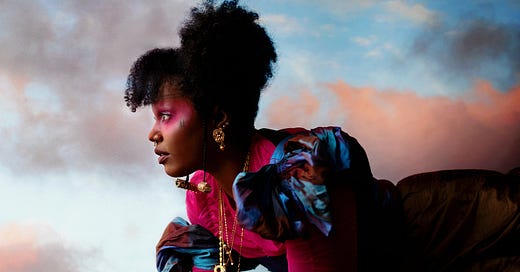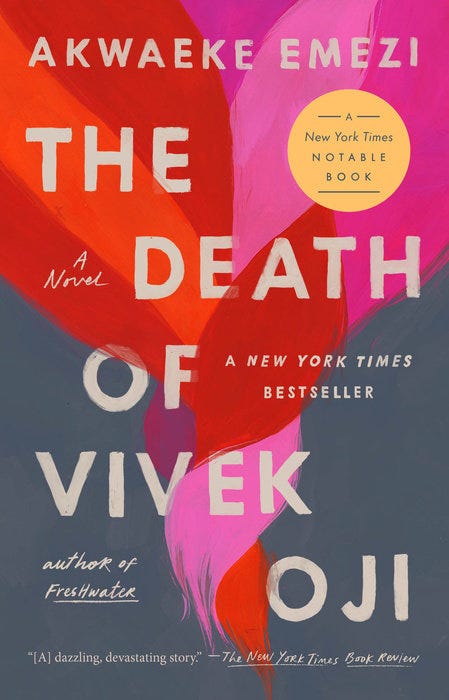Why I ♥️ "The Death of Vivek Oji" by Akwaeke Emezi (and Everything Else They Write)
The Books We ❤️ Club welcomes Holly Starley of Holly Starley's Rolling Desk and Caravan Writer's Collective
Somehow, in the first eight months of this book club, all the authors selected by my guest writers were men. My guests were evenly split, gender-wise, but the books and authors they wanted to talk about were decidedly not, and once I realized it, I immediately set about remedying the situation with specific requests for female, queer, trans, or authors of color.
My dear friend Holly Starley stepped up. If you don’t know her work, I urge you to pop over to Holly Starley’s Rolling Desk for a treasure trove of personal stories that transcend memoir, equally encompassing nature writing, philosophical musings, and minutely observed moments in her van-life adventures—think Nomadland meets Rebecca Solnit.
I had never come across Akwaeke Emezi in all my literary wanderings—I tend to take a very dithering, eyes on the ground approach to reading (and to life)—so I was pleased as punch when Holly suggested them, a non-binary, trans, African writer with ambitious plots and characters walking paths I might not otherwise have crossed.
We hope you enjoy this month’s edition of The Books We ❤️ Club discussing their award-winnning and NYT Bestselling novel, The Death of Vivek Oji.
Happy reading! ~ MTF
The Books We ❤️ Club—the book club you don’t actually have to read the book, leave the house, or even change out of your jammies to enjoy—as writers sing the praises of books that reach into our hearts.
We invite you to add your own reactions, insights, and ideas in the Comments for an impromptu book club session. Share your favorite quotes, characters, moments, and surprises in discussion with other passionate readers.
(And if you’d like to feature your favorite book in a future edition, DM me.)
NEXT TIME: “Why I ❤️ Norton Juster’s The Phantom Tollbooth” by of The Happy Place and
Why I ♥️ The Death of Vivek Oji by Akwaeke Emezi (and Everything Else They Write)
by
of Holly Starley’s Rolling Desk and Caravan Writers CollectiveYou know when you’re reading and a passage takes your breath, leaving you at once certain words are the most powerful thing on earth and wistful—oh to have held the pen that wove the tapestry of those words?
That’s how reading Akwaeke Emezi is for me. So many of their passages land in my heart—with a sigh of wonder, with an ohhhhhhh of understanding, with a thud of shock or despair, a flutter of hope or longing. The Death of Vivek Oji was the first of their books I picked up. (I wish I could remember what brought me to them. Was it an interview somewhere?) Since Vivek, I’ve read everything they’ve written.
Or so I thought. I googled Emezi’s ever-burgeoning canon for this essay and discovered I’ve two more books, published this year, to enjoy. One of them, publisher Harper Collins describes as “a steamy paranormal romance set in the Black South.” This is another thing about Emezi that I love, both as a reader and as a writer. They are bold and multi-genred. They make film and music and visual art. They do not shy from contradiction or complexity or difficult subject matter. They feel, both in their work and in what I’ve learned of their life and heard of their interviews, untamable and relentlessly, vibrantly themselves. So they make me brave, with my own words, my own life.
Emezi dives courageously and unapologetically into taboo. This is the case in both Vivek and the young adult novel that vied to be the topic of discussion for The Books We ♥️ Club, Pet, which deals with child sexual abuse and which Emezi has called “an exercise in trying to believe in something better” amid “despair about the world.”[1] I’ll leave the full revelation of all the taboos in Vivek to Emezi.
But I’ll say this: Relationships, or, rather, their often deeply complicated nature—how they can be pure and beautiful and fraught with all we bring into them from our own pasts and those of our families—is among Vivek’s prominent themes. Early on, we see the meeting of Vivek’s parents, Kavita and Chika, through Chika’s eyes:
“That morning, she was wearing an orange cotton dress. She looked like a burning sunset. And Chika knew immediately that his story would end with her, that he would drown in her large liquid eyes, and it would be the perfect way to go. There was nothing boiling in him, just a loud and clear exhale, a weight of peace wrapping around his heart.”
Right after that, we learn Kavita immigrated to Nigeria from India with her uncle after her parents’ death due to “problems” because of her father’s caste. And we learn Chika, too, has moved, in his case, to a new city to start over: “Fresh starts were good. That separateness was where you could feel yourself, where you could learn who you were apart from everyone else.” This idea, posited at the beginning of the book, will remain like an echo throughout its pages as we see the unfurling of the characters’ progress toward learning who they are on their own and also the impossibility of separateness.
Another early passage shows Vivek’s cousin, Osita, describing his soon-to-be girlfriend, who will end up in a different relationship by Vivek’s end: “She was a runner, lean and long-boned with a sway neck. I once tried to beat her at a footrace, but it was useless. She moved like the ground was falling away beneath her feet, the future rushing toward her.”
Vivek’s complexity isn’t just thematic; it’s also structural, both in terms of timeline and point of view. So the future is, indeed, rushing toward the characters. But it’s also, as the title implies, already behind them. It’s also swirling all around them, stopping them in their tracks and propelling them toward the inevitable. We see the events unfolding through a handful of characters’ voices. (If you’re a listener of books, I highly recommend the Penguin Random House Audio production; the voice actors’ reading is spectacular.) It’s no spoiler—again the title—to tell you the main protagonist dies. Yet we’re not deprived of Vivek’s perspective, even of words from beyond the grave. All of these layers work brilliantly to create a world where multiple things are true at once, where linearity is nowhere near sufficient to capture the experience of loving and living unhindered—to capture the truth of how capable we are of holding ourselves and others and how poignantly we fail each other and ourselves.
Emezi was born in Umuahia and raised in Aba, Nigeria. In Vivek and in other of their writings, you get a sense of the role Igbo ontology plays in their work and life. Before I’d learned more about them, I’d have described Emezi as believing certain people are born with a, for lack of a better word, quality that’s both burden and gift—something compelling them to question, to press against familial and societal norms, something that demands of them profound joy and pain, something that contains pieces of past and future, ancestral lines in both directions. So I wasn’t surprised to learn that Emezi identifies as ọgbanje, a trickster Igbo spirit born into a human body.
In an interview for Colors, Nigeria, Emezi talks about colonialism as replacing not just the language, culture, and religion of the colonized but also their reality (here they reference the work of Patrice Somé): “Things that were real for millennia became unreal because white people showed up and violently said that they were make-believe.”[2] Emezi brings that replaced reality back, pulls it into the contemporary world in a way that makes clear it was never really gone.
Liminality is another of Vivek’s themes. Like the title character, Emezi themselves is nonbinary (in their term, genderless). And, in a way, that has made them nationless. Because of their openness about their queerness and their visibility, living in Nigeria is unsafe. So they make their home elsewhere. As a member of the Nigerian diaspora, they redistribute resources to black trans people in Nigeria and amplify organizers working to make change there.
Unlike the author, Vivek remains in Nigeria.
A little over midway into Vivek, the title character asks, what to me is, the central question of the book: “Why are you so afraid? Because something is different from what you know?”
That specific fear is a thread laced throughout the story, threatening to bind or choke the characters and, often, being teased tenderly open, nearly floating free. That fear is in the young man afraid of his own sexuality. We see him sleeping next to another young man, whose hair—long and silky, a point of much contention—“drowns his arm.” We see him resist the urge to tuck back the “tendril of hair” on the other man’s cheek.
And before that we see this (a demonstration of Emezi’s restraint):
“I kept my eyes on the page as the match rasped into fire, through the breath he released to extinguish it. The lamp made my book glow a dull orange that spread faintly to the walls. The rest of the room was halfway in shadow, swallowing Vivek in grayness as he pulled off his shirt and folded it and then took off his jeans and hung them in the wardrobe. I kept reading as he sprawled in the bed in his boxers and stared at the ceiling. Eventually, his breathing settled. I put down the book and climbed in the bed, leaning over to blow out the lamp. The room fell into black.”
Here, the skillful light touch underscores the tenderness. Elsewhere, Emezi’s depictions of the dynamics in this relationship (and much else) are full-throated, daring us to look away while pulling us in with their beauty.
That thread of fear of what one doesn’t know or understand is also in the mother, who says Hail Marys, rubbing the beads of her rosary colorless “till she thought her hands were actually full of grace,” and who believes her son’s long hair is just a phase (though she knows deep down it isn’t the “problem”).
It’s in the priest, whose advice is to pray some more.
It’s in the father, who turns from his burning sunset, from the peace wrapped around his heart to an affair in order to hide from his own pain, from what’s going on with his child that he wishes not to see.
It’s in the aunt who prefers her own church—one that “fights these things with holy water”—and who allows that church to perpetuate ugliness and abuse against the very person whose safety she claims to be her only concern.
It’s in the novel’s cultural milieu, in the fact that, there in Nigeria, being a person who others read as “man” and who also has long, silky hair and is the embodiment of joy when twirling in a dress the color of sea with scarlet hibiscus flowers, is a real and possibly deadly fear.
That fear is even in the tender belief of the mother that such a fate can be avoided because her child is among those who have always known their family.
So Vivek is about pain. It’s about the deep wounds and trauma that can be inflicted from a combination of phobia and love, of panic and desire to protect but not understand. But/And it’s also about joy. It’s about the profound healing that can be imparted by way of gentleness and loyalty and meeting others exactly where they are. It’s about the ecstasy that comes from allowing ourselves / being allowed to be exactly who we are. It’s about heeding our own inner voice—no matter what society or family or anything else has drummed into us.
As Vivek tells his cousin, “You know what’s been happening in your head. You are the only person who knows. So ask yourself if it feels right, and somewhere, deep inside of you, there’s a compass that will tell you whether you’re right or wrong.”
Does following that internal compass, in the end, win out? This question, too, as I believe with all things Emezi, they answer with a yes/and.
[1] Arenike Adebajo, “‘I’ve never known a life without stories’: An interview with Nigerian author Akwaeke Emezi,” Colors, spring 2022.
[2] Adebajo, “Interview with Emezi.”















Troy, thank you for featuring Akwaeke Emery and letting me sing their praises over here on your fantastic part of Stackland. How fun to gush about an author I love.
Thank you, my dear Holly, for introducing me to Emezi's novels - I hope others are equally inspired to pick up their work! 🩵❤️💜